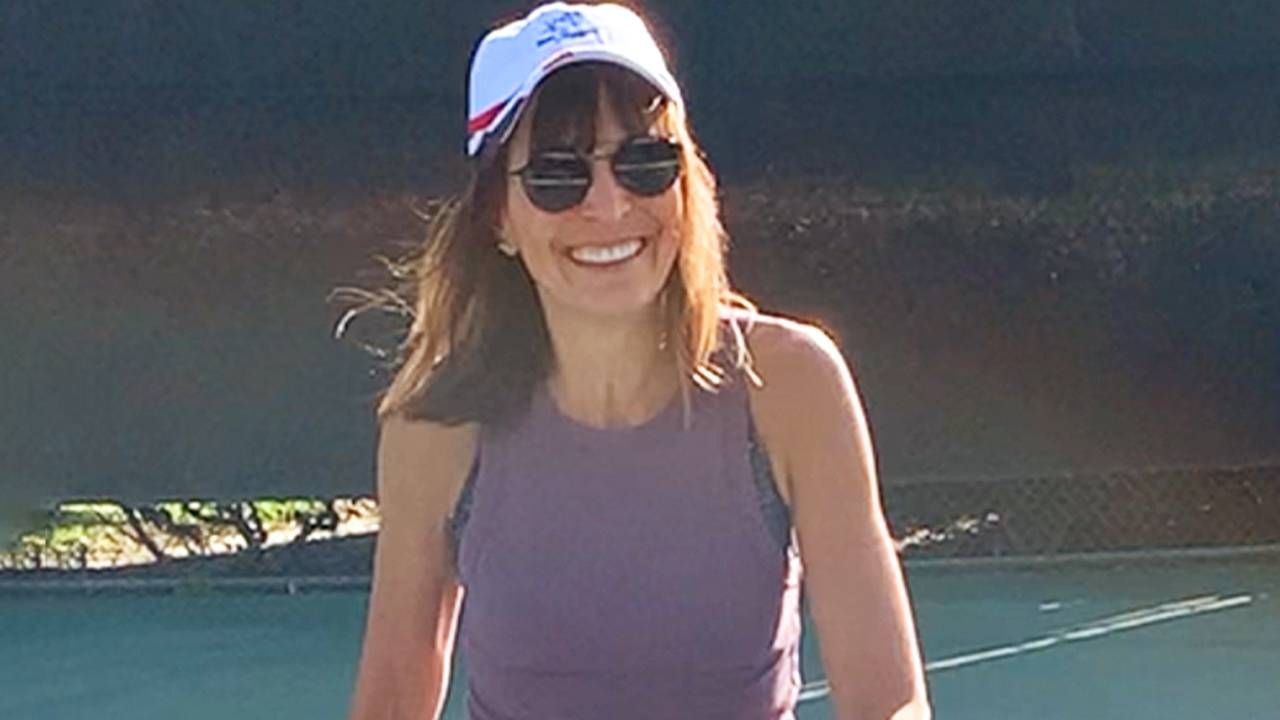Adventures in Tennis: The Mental Health Makeover I Needed
Despite an injury, tennis has given me a physical and mental health boost and I'm hooked
In May 2021, my daughter asked me what I wanted for Mother's Day, and I chose something that would not cost her a penny. The request? I asked her to play tennis with me.

Even though we had not played in years, I thought this would be a fun way to spend quality time together, solidify our relationship more, and maybe if our tennis date went well, we would play more often. Happily, this is exactly what happened, as well as the added boost to my mental health.
We started 'playing' regularly, but I was far from the player I wanted to be. Our quality time together broke up the monotony of social isolation and Zoom fatigue, while providing the levity and connection we needed.
After not playing just the first week of my injury, I felt my mood shift on a Saturday morning when I would normally be at practice at 8:00 a.m.
I started to love the game so much that I signed up for group tennis lessons through our local community. Now, a year later, this was one of the best decisions I made for my mental and physical health.
I never realized the impact tennis would have on my life until early February 2022 when I tore my triangular fibrocartilage complex (TFCC) from overuse and a sudden fast twist of my wrist in a game.
After three doctor's visits, an MRI, and way too many (anxiety inducing) Google searches on the anatomy of my painful wrist, I learned I had a moderate tear; this explained why I felt excruciating pain, a popping feeling, and the uncontrollable urge to swear loudly and frequently. Good thing my kids are in college, because I would have easily won the "Worst Mother of the Year Award for Potty Mouth."
Impatient to Get Back to Playing
I did not even know I had a TFCC and ligaments that would be prone to sprain. The pain was debilitating, and I had to take months off from playing, while adding physical therapy and rest to my schedule.
Rest? That word was not part of my vocabulary. After not playing just the first week of my injury, I felt my mood shift on a Saturday morning when I would normally be at practice at 8:00 a.m. I was so impatient to get back into the game, and knew I had a bad case of FOMO — Fear of Missing Out.
About a month later, I tried unsuccessfully (and painfully) to hit balls from a tennis machine. I am not one to sit still and staying active before and during the pandemic has kept me feeling mentally and physically healthy, while introducing me to new people in a very isolating, disconnected time, so this tennis injury was not something I embraced at first.
I did not actually realize that there were lessons to be learned from my injury; this happened through reflection, and all the time I suddenly had to take a deep dive into my injury.
Playing tennis for nine months straight gave me something to look forward to every weekend, and I kept learning different techniques and practicing in between our group lessons. I felt the same excitement I did when I played sports in high school and college. The sense of camaraderie, sportsmanship, and seeing what I could achieve was different now; this time around playing tennis in my '50s was just the mood boost I needed because the only connections I had with people were through Zoom or Trader Joe's.
This time, I could disconnect from my life and the world for 90 minutes and take a break from the anxiety and restrictions of the pandemic. I could laugh at my mishaps, learn new tennis skills, and make friends along the way.
Most recently, I had an inspiring conversation about mental health and sports with Tommy Minkler, a Ph.D. candidate in sport, exercise, and performance psychology at West Virginia University, where he is also pursuing a M.A. in Clinical Mental Health Counseling.
We were joined on my series, OUTSIDE THE BOX, by his fellow doctoral student and research colleague Luna Ugrenović, a native of Belgrade, Serbia, a third-year doctoral student at West Virginia University in the sport, exercise, and performance psychology program who is simultaneously working on a master's degree in clinical mental health counseling. As a student-athlete, Ugrenović was a member of a two-time NCAA Division II championship rowing team.
When asked about research on mental health and sports, Minkler says, "The literature generally demonstrates that social isolation produces worse mental health outcomes, and that physical activity (particularly group physical activity) can be beneficial."
Research shows the connection between physical activity and mental health during the first year of COVID-19; this was true in my own life when I made the decision to choose activities that would boost positivity and connect me with others, such as when I signed up for a two-day motorcycle class in 2020.
However, my less riskier diversion, tennis lessons, has had numerous benefits on my mental, physical and emotional health.
Positive Effects on My Physical and Mental Health
While in recovery mode, I continued my daily walks, watching the inspiring early morning pickleball and tennis players defying ageist stereotypes. I was determined to get back in the game and refused to think that my tennis days were over from this annoying wrist injury.
Making the commitment to play tennis for the past year was one of my best self-care decisions in the pandemic, and I see this as a life-long sport.
Instead of binge watching Netflix, I was glued to my phone watching YouTube videos of Venus Williams and her legendary tennis coach Rick Macci, recently portrayed in the award-winning movie "King Richard." I wanted to be better prepared to get back in the game, be aware of techniques I needed to improve upon and do my best to avoid another injury. This felt like my training for a comeback — whatever that meant!
Through the experience of learning tennis for nine months and then missing the game, I realized what a significant role tennis had in my life, positively affecting my physical and mental well-being, while also opening me up to new social connections that were lacking in the pandemic.
But something else occurred to me. I had to pause and reflect on the fact that I needed to not to push myself so hard and to listen to my body. Now, when I am out on the court practicing, my self-talk is kinder and more encouraging instead of berating for all the bad swings and balls hitting the net.
Before my TFCC injury, I would focus on my mistakes and not concentrate on what was next. I feel so fortunate to be back on the court again and through this healing journey, I feel more relaxed and focused; it was as if I fired the old coach for all the negative self-talk and hired a nicer one!
Making the commitment to play tennis for the past year was one of my best self-care decisions in the pandemic, and I see this as a life-long sport. I feel calmer and happier with other aspects of my life, and athletics have always been an incredible outlet for me to take time for myself, learn something new, and connect with others.
So, what's next? I will keep you posted. I just signed up for the summer tennis league.


